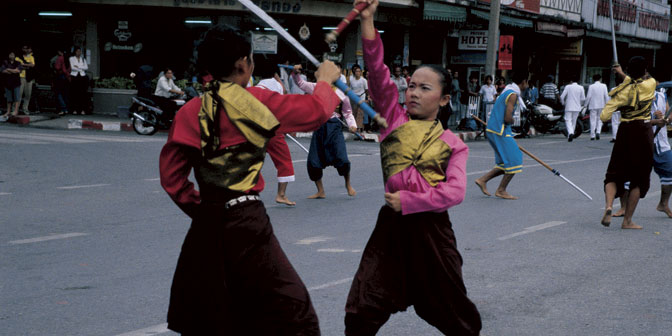Celebrating Women as Brave

Thao Suranari Festival - Nakhon Ratchasima, Thailand
This is an excerpt from the book Celebrating Women.
The first evening, wives of local and national officials lean against embroidered pillows on mahogany sofas to watch the Thao Suranari Festival's opening ceremonies. The women's designer suits are of Thai silk; their diamonds and emeralds are real.
An elegant woman who speaks perfect English invites me to sit with them. Certainly my appearance doesn't merit the invitation: a long cotton skirt, t-shirt and waist-pack bulging with lenses and film. Maybe she asks because I am the only foreign visitor, I have grey hair, it is too hot to stand up, or because Thai hospitality is unstinting. The matrons smile as a breeze begins to blow; we are grateful for the relief.
Performers wearing purple and yellow silk costumes sing about Ya Mo, a woman who was later titled Thao Suranari, Brave Woman. “Our grandmother saved us from suffering as slaves. The victory of Ya Mo will be remembered in our hearts…She was not afraid of men… On her anniversary, we respect her, we salute her.”
They kneel in the street to face the statue of Ya Mo, which is banked with lotus buds, offerings, and incense. Impervious to the smattering of raindrops, the dancers sway their arms above their heads, then create butterflies with their graceful hands.
I was told that it rains every year during the opening ceremony. But there has been drought for eight weeks so I left my umbrella in the hotel. The storm gathers force. “A Miracle!” people shout. “Sacred Rain!” The devout unfurl their umbrellas. The dancers’ outfits are saturated and turn dark. Torrents make the world invisible; I remove my streaming glasses and try to continue photographing, but moving becomes impossible: my soggy skirt trips me; I slide off my sandals. Worried that my camera electronics may be ruined for the ten-day festival ahead, I wrap my equipment in a plastic bag offered by a flower vendor, and give up.
The dancers continue their blissful tribute to Thao Suranari. The women's dance will end in an obeisance: they must prostrate themselves in the street where rainwater now overflows the curbings. Not one dancer balks. They lie face down in the water, honored to salute to the statue of the woman who saved their city with her sword.

